
Sociological Methodology
Scope & Guideline
Innovating methodologies to address complex social issues.
Introduction
Aims and Scopes
- Quantitative Methodologies:
The journal emphasizes the use of quantitative methods, including advanced statistical modeling, multivariate analysis, and causal inference techniques, to analyze social phenomena. - Methodological Innovations:
A core aim is to promote methodological innovations that address contemporary challenges in sociological research, such as network analysis, machine learning, and advanced data imputation techniques. - Interdisciplinary Approaches:
Sociological Methodology encourages interdisciplinary research that integrates methods from fields like psychology, economics, and data science to enrich sociological methods. - Focus on Data Quality and Ethics:
The journal also addresses issues related to data quality, ethics in research design, and the implications of methodological choices on sociological findings. - Applications in Real-World Contexts:
Research published in the journal often applies methodologies to real-world issues, providing insights into social dynamics, public policy, and community studies.
Trending and Emerging
- Machine Learning Applications:
There is a notable increase in research applying machine learning techniques to sociological problems, reflecting the broader trend of data science integration into social research. - Network Analysis:
An emerging theme is the use of network analysis to understand social interactions and structures, demonstrating a growing interest in how social networks shape behaviors and outcomes. - Dynamic Modeling Techniques:
Recent publications show a trend toward dynamic modeling methods that account for changes over time, enhancing the understanding of social phenomena across different temporal contexts. - Cross-Disciplinary Methodological Integration:
Research that integrates methodologies from various disciplines is on the rise, fostering innovative approaches to sociological questions and enhancing methodological rigor. - Focus on Data Imputation and Quality:
There is an increasing emphasis on advanced data imputation techniques and methodologies to improve data quality, indicating a growing concern for the reliability of sociological data.
Declining or Waning
- Traditional Survey Methods:
There appears to be a decrease in the publication of papers focusing solely on traditional survey methodologies, as more researchers explore innovative data collection techniques and mixed-method approaches. - Static Data Analysis:
Research centered around static data analysis methods, which do not account for temporal changes or longitudinal data, is becoming less prevalent, reflecting a shift towards dynamic modeling techniques. - Single-Domain Analyses:
Studies that only analyze single domains without considering the intersectionality of social factors are less frequent as the field moves towards more integrative and multi-domain analyses. - Basic Statistical Techniques:
Papers focusing on basic statistical techniques without innovation or application to complex sociological questions are declining, as the journal seeks more sophisticated methodological advancements. - Qualitative Methodologies without Quantitative Integration:
There is a waning interest in qualitative methodologies that do not incorporate quantitative elements, as the journal increasingly values mixed-methods approaches.
Similar Journals

Statistics and Applications
Unlocking the Potential of Statistics in Real-World Applications.Statistics and Applications is an esteemed academic journal dedicated to disseminating innovative research findings and advancements within the field of statistics and its diverse applications. Published by SOC STATISTICS COMPUTER & APPLICATIONS, this journal operates under an open access model, ensuring that critical knowledge and research are freely available to researchers, professionals, and students worldwide. With an ISSN of 2454-7395, it serves as a key platform for scholars to share their insights on statistical methodologies, computational techniques, and novel applications across various disciplines. Although the journal’s impact factor is not currently listed, its commitment to rigorous peer review and high-quality publications positions it as a valuable resource in the continuously evolving domain of statistics. By fostering collaboration among researchers and encouraging the sharing of knowledge, Statistics and Applications contributes significantly to the advancement of statistical science and its applications in real-world problems.
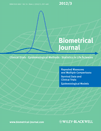
BIOMETRICAL JOURNAL
Elevating the standards of quantitative research in health.BIOMETRICAL JOURNAL is a prestigious academic publication dedicated to advancing the fields of Medicine and Statistics. Published by WILEY since its inception in 1977, this journal plays a critical role in disseminating cutting-edge research and methodologies that bridge the gap between statistical theory and real-world medical applications. With an impressive Q1 ranking in both Medicine (miscellaneous) and Statistics, Probability and Uncertainty, it is recognized for its high-impact contributions to the scientific community. The journal actively encourages submissions that utilize innovative statistical techniques to address complex biomedical issues, making it an essential resource for researchers, professionals, and students aiming to enhance their understanding of quantitative approaches in health and medicine. Although the journal is not open access, its rigorous peer-review process guarantees the quality and relevance of published works, further establishing its significance in the academic landscape.
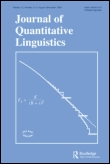
Journal of Quantitative Linguistics
Empowering Research with Rigorous Data-Driven LinguisticsThe Journal of Quantitative Linguistics, published by Routledge Journals, Taylor & Francis Ltd, stands as a pivotal resource in the field of linguistics, particularly in the rigorous application of quantitative methodologies to language research. Since its inception in 1994, this esteemed journal has contributed significantly to the understanding of linguistic phenomena through empirical data analysis, and it continues to maintain its esteemed Q1 ranking in the linguistics and language category as of 2023. Researchers and professionals will find a wealth of knowledge within its pages, as it publishes original articles, critical reviews, and methodological developments that push the boundaries of language study. While the journal is not open access, it remains widely accessible through institutional subscriptions, ensuring that a diverse readership can engage with the latest findings and theoretical advancements. As the journal looks forward to celebrating 30 years of impactful research by 2024, it remains dedicated to fostering discourse and innovation in the examination of language using quantitative approaches.

BMC Medical Research Methodology
Fostering Collaboration for a Healthier TomorrowBMC Medical Research Methodology is a prestigious open-access journal published by BMC, dedicated to advancing the field of medical research methodologies. Launched in 2001, the journal has established itself as a vital resource for researchers, reflecting its high-quality contributions with a strong Q1 ranking in both Epidemiology and Health Informatics as of 2023. As a scholarly platform, it offers broad access globally, ensuring that the latest developments in research methodology are readily available to professionals, scholars, and students alike. With its commitment to enhancing the rigor and transparency of medical research, BMC Medical Research Methodology plays a critical role in shaping the future of evidence-based practices, making it an essential read for anyone involved in medical research. The journal is based in the United Kingdom at CAMPUS, 4 Crinan St, London N1 9XW, England, and provides comprehensive access options to facilitate the dissemination of knowledge and foster collaboration across the global research community.
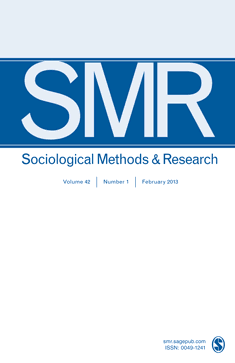
SOCIOLOGICAL METHODS & RESEARCH
Elevating the discourse in sociology with empirical excellence.Sociological Methods & Research (ISSN: 0049-1241, E-ISSN: 1552-8294) is a premier academic journal published by SAGE Publications Inc. in the United States, dedicated to advancing the field of sociology through the dissemination of rigorous methodological strategies. With an impressive impact factor and recognized as a Q1 journal in both Sociology and Political Science, it holds a prestigious position in the Scopus rankings, placing 7th out of 1,466 in Sociology and Political Science and 5th out of 604 in miscellaneous social sciences. The journal, which has been in continuous publication since 1972 and will extend through 2024, serves as an essential resource for researchers, practitioners, and students aiming to explore innovative methodologies and empirical research in sociology. Although it is not an open-access journal, it remains highly influential, making significant contributions to sociological scholarship and shaping contemporary discourse in the social sciences.
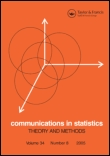
COMMUNICATIONS IN STATISTICS-THEORY AND METHODS
Unveiling insights that shape contemporary statistics.COMMUNICATIONS IN STATISTICS-THEORY AND METHODS is a distinguished journal published by Taylor & Francis Inc, dedicated to advancing the field of statistics through rigorous theoretical and methodological research. With an ISSN of 0361-0926 and an E-ISSN of 1532-415X, this journal serves as an essential platform for statisticians, researchers, and academics to disseminate their findings and engage in scholarly discourse. It covers a broad spectrum of topics within the realms of statistics and probability, maintaining its relevance in the academic community, as indicated by its prestigious Q3 category rank and Scopus percentile ranking of 51st in its field. Launched in 1976, the journal has been pivotal in shaping contemporary statistical methodologies up to 2024 and offers a robust archive of knowledge and insights, despite its non-Open Access status. By fostering high-quality peer-reviewed articles, COMMUNICATIONS IN STATISTICS-THEORY AND METHODS continues to play a vital role in the development and dissemination of statistical theory, making it indispensable for students and professionals striving to stay at the forefront of statistical science.
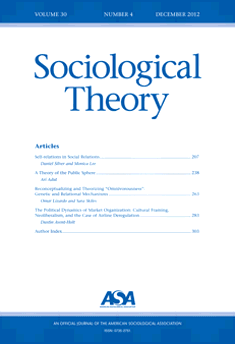
SOCIOLOGICAL THEORY
Exploring contemporary issues with rigorous theoretical frameworks.Sociological Theory, published by SAGE Publications Inc, is a premier journal dedicated to advancing the field of sociology through innovative theoretical approaches and empirical research. With an impressive impact factor and recognized as a Q1 journal in both Sociology and Political Science, it ranks 86 out of 1466 in its category, placing it in the 94th percentile according to Scopus metrics. This journal seeks to foster rigorous debate and insight on contemporary sociological issues, welcoming contributions that challenge existing paradigms and offer new perspectives. Founded in 1996, Sociological Theory continues to push the boundaries of sociological inquiry through its commitment to quality and relevance, making it an essential resource for researchers, professionals, and students alike. Based in the United Kingdom, this journal is not an open-access publication, but it remains widely accessible through institutional subscriptions, ensuring that its valuable content reaches a global audience interested in the dynamics of social life.

SOTSIOLOGICHESKIE ISSLEDOVANIYA
Fostering Insightful Perspectives on Social SciencesSOTSIOLOGICHESKIE ISSLEDOVANIYA, published by the esteemed Russian Academy of Sciences and the State Academy University of Humanities (GAUGN), is a pivotal journal in the field of sociology and political science. With a rich publishing history dating back to 1981 and continuing through controlled converged years until 2024, the journal provides a platform for innovative research and discourse. Although currently not open access, it holds a respectable position in academic circles, as evidenced by its 2023 Scopus rank of #864 out of 1466, placing it in the 41st percentile of its category. As a Q3 quartile journal, it serves as an essential resource for researchers, professionals, and students seeking to engage with contemporary sociological and political issues within the Russian context and beyond. With the journal's focus on meaningful contributions to social sciences, it encourages the dissemination of knowledge and fosters a deeper understanding of societal dynamics.
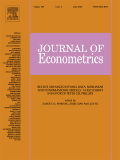
Journal of Econometrics
Unveiling the Complexities of Economic Data Analysis.Journal of Econometrics, published by ELSEVIER SCIENCE SA, is a leading journal in the fields of applied mathematics and econometrics, with a commendable reputation established since its inception in 1973. The journal's ISSN 0304-4076 and E-ISSN 1872-6895, reflect its commitment to quality research output, and it enjoys a high impact factor, ranking in the Q1 category for economics and applied mathematics as per the latest 2023 assessments. The journal aims to provide rigorous theoretical developments, empirical analyses, and methodologies in the rapidly evolving discipline of econometrics, thus catering to a diverse audience of researchers, professionals, and students alike. While currently not offered in an open access format, the quality and depth of research articles published within its pages make it a vital resource for anyone interested in the quantitative analysis of economic data. With a strong ranking in Scopus, particularly in the 96th percentile for applied mathematics, Journal of Econometrics continues to be at the forefront of academic inquiry, fostering advancements in both theory and practice within the global economy.

CONTEMPORARY SOCIOLOGY-A JOURNAL OF REVIEWS
Connecting Ideas, Shaping Perspectives.CONTEMPORARY SOCIOLOGY: A JOURNAL OF REVIEWS, published by SAGE Publications Inc, is a pivotal platform within the field of sociology that has been contributing to the academic discourse since its inception in 1979. With a focus on providing comprehensive reviews of recent sociological literature, this journal plays an essential role in bridging the gap between theoretical frameworks and empirical research, thereby enhancing the understanding of socio-political dynamics. Although it currently holds a Q4 ranking in Sociology and Political Science, the journal invites submissions that challenge the status quo and broaden the academic conversation. Positioned within the competitive Scopus rankings, this journal serves as an invaluable resource for researchers, professionals, and students aiming to stay abreast of emerging trends and significant developments in sociology. With rigorous peer-review practices, CONTEMPORARY SOCIOLOGY ensures that readers engage with high-quality, impactful research. It is available in print and electronic formats, fostering access to the latest reviews from the forefront of sociological inquiry.